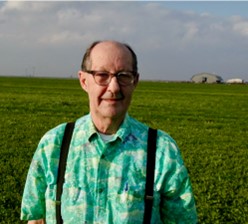
William “Bill” Williams
Professor of Agronomy and Range, Emeritus
William “Bill” Arnold Williams was a prominent and world-renowned professor of Agronomy and Range Science (currently named Plant Sciences) at UC Davis for more than 40 years, making significant contributions to the agricultural sciences even after his retirement in 1992.
Dr. Williams died of cardiac arrest on May 21, 2003, at South Sacramento Kaiser Hospital. He was 80 years old. He was born in Johnson City, NY, on Aug. 2, 1922, and graduated from Johnson City High School in 1940 as valedictorian of his senior class. For a year after high school, he worked at the IBM factory in nearby Endicott, NY, at night to earn money for college.
For two summers, in 1940 and 1941, he worked on a friend's family farm to gain experience in agriculture, which was a requirement for acceptance to Cornell University's Agriculture College. He enrolled in Cornell's agronomy department in 1941 and obtained the top grades in his freshman class. During his freshman year, he met Pat Moore and they were married on Nov. 27, 1943. During WWII Bill was a second lieutenant with the field artillery and served in Okinawa. In 1946 he returned to Cornell to complete his bachelor's degree, master's degree and Ph.D. During this time, he and Pat had three children – David, Kathy and Andy.
Dr. Williams attained a faculty position at the UCD Department of Agronomy in April 1951. He became a high-level full professor and although he retired as a top scientist in his field after 41 years, he continued to work as a scientist and mentor for another decade. Bill was internationally recognized as an authority in the application of modelling and statistics to crop production and ecosystem structure and function. In a widely cited paper written with Dr. Robert Loomis, they estimated maximum crop productivity and liked it to canopy architecture. He was an expert in the introduction and testing of forage legumes such as berseem and subterranean clover grown on range and croplands of California and had keen interest in the benefits of legumes and cover crops in rotations. He was the key statistician in designing the Long-Term Crop Rotation Study established at the Agricultural Sustainability Institute of UC Davis in the early 1990s to examine the influence of crop rotation and cover crops on long-term soil health. Bill generously shared his legendary expertise in applied statistics with colleagues and students, who remember him for his patient explanations, eclectic curiosity and spirit of joint learning. Many generations of students benefitted from his courses and thoughtful teachings and sought him for advice.
Dr. Williams was recognized with several awards. He received a Fulbright Scholarship to Adelaide University, Australia, and took the family there for a year in 1966. He participated on a National Science Foundation Amazon Alpha Helix research vessel expedition in 1967. In 1967-68 he was Academic Assistant to Chancellor McCorkle. He received multiple prestigious NSF grants. In addition, he was chief editor of the agricultural section of the McGraw-Hill Encyclopedia of Science and Technology for 18 years. He was a member of Alpha Zeta, Phi Kappa Phi, Sigma Xi, American Society of Agronomy, Soil Science Society of America, Society of Range Management, Association for Tropical Biology and the Mathematics Association of America. In 2003, he was honored by the American Society of Agronomy for his "advancement of human welfare and the enhancement of California agriculture."
After retiring in 1992, Bill continued to go to work every day, including Sundays, for 11 years until a few weeks before he died. He was an important mentor to younger faculty and students at the University even after his retirement. An avid scientific reader, he was famous for placing interesting articles in student and fellow faculty mailboxes, with subjects ranging from math to climate change to unusual Amazon plants to rangeland and forage production systems. Bill remained active intellectually, editing the Agricultural Encyclopedia and many other peer-review journals and manuscripts. He frequented research field days and assisted many UC Farm Advisors in their research. After Pat and Bill’s second son passed away in the early 2000s, they established the Bill and Pat Williams Endowment to benefit forage research at UC Davis, which continues to fund agricultural research to this day.
Bill and his wife Pat Williams worked passionately to improve care for the mentally ill in the community. They experienced severe mental illness in their family and saw a need to provide better services to mentally ill adults in California and nationwide. They founded Pine Tree Gardens, a local non-profit with residential facilities to assist adults with mental illness, and a therapeutical farm-based program. They both became life-long local and national advocates for those suffering mental illness and strived to bring the issue to the forefront and out of the darkness and stigma often associated with mental illness. They continued to support Pine Tree Gardens even after it was established, holding fundraisers, doing weekly sing-a-longs, and personally knowing and supporting residents at the facility. In November 2002, Bill and Pat received the Thong Hy Huynh Memorial Award from the Davis Human Relations Commission for their humanitarian work. They also were honored in October 2002 by the Yolo County Mental Health Services Agency for their many years of dedication, endless courage, unlimited time and support for the mental health community of Yolo County.
As of the mid-2020s, Bill is survived by his daughter, Kathy Williams Fossdahl, who resides in Davis.
- Mel George, Emilio Laca and Daniel H. Putnam
